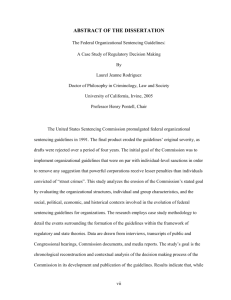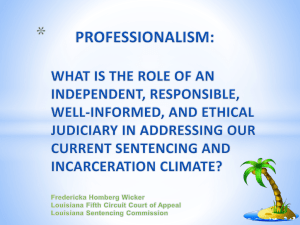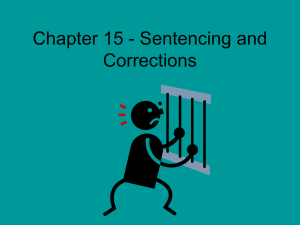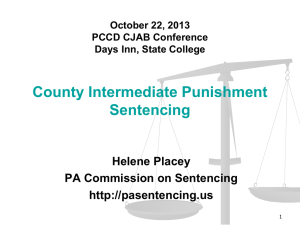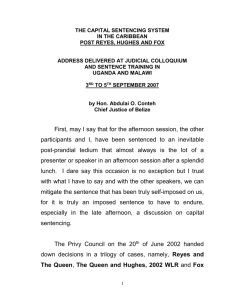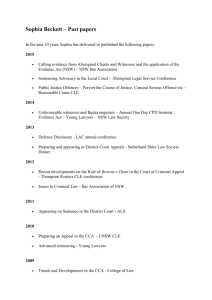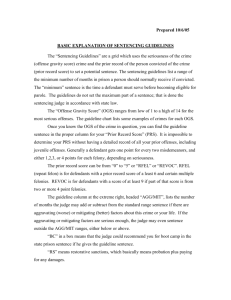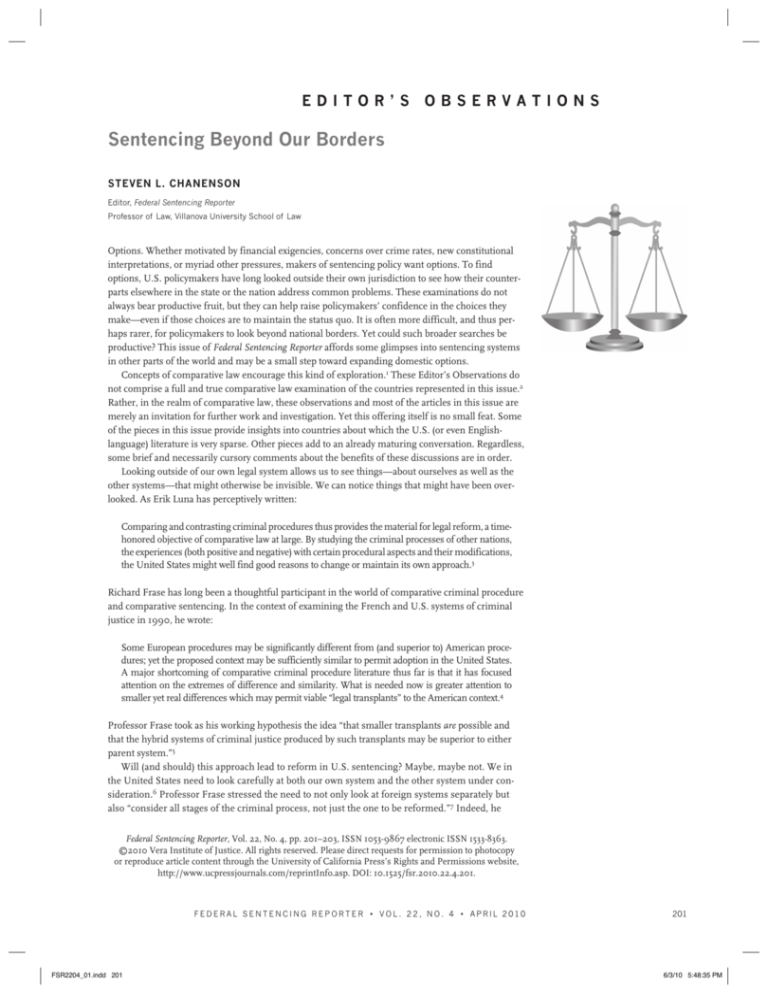
EDITOR’S
O b ser v a tio n s
Sentencing Beyond Our Borders
Steven L. Chanenson
Editor, Federal Sentencing Reporter
Professor of Law, Villanova University School of Law
Options. Whether motivated by financial exigencies, concerns over crime rates, new constitutional
interpretations, or myriad other pressures, makers of sentencing policy want options. To find
options, U.S. policymakers have long looked outside their own jurisdiction to see how their counterparts elsewhere in the state or the nation address common problems. These examinations do not
always bear productive fruit, but they can help raise policymakers’ confidence in the choices they
make—even if those choices are to maintain the status quo. It is often more difficult, and thus perhaps rarer, for policymakers to look beyond national borders. Yet could such broader searches be
productive? This issue of Federal Sentencing Reporter affords some glimpses into sentencing systems
in other parts of the world and may be a small step toward expanding domestic options.
Concepts of comparative law encourage this kind of exploration.1 These Editor’s Observations do
not comprise a full and true comparative law examination of the countries represented in this issue.2
Rather, in the realm of comparative law, these observations and most of the articles in this issue are
merely an invitation for further work and investigation. Yet this offering itself is no small feat. Some
of the pieces in this issue provide insights into countries about which the U.S. (or even Englishlanguage) literature is very sparse. Other pieces add to an already maturing conversation. Regardless,
some brief and necessarily cursory comments about the benefits of these discussions are in order.
Looking outside of our own legal system allows us to see things—about ourselves as well as the
other systems—that might otherwise be invisible. We can notice things that might have been overlooked. As Erik Luna has perceptively written:
Comparing and contrasting criminal procedures thus provides the material for legal reform, a timehonored objective of comparative law at large. By studying the criminal processes of other nations,
the experiences (both positive and negative) with certain procedural aspects and their modifications,
the United States might well find good reasons to change or maintain its own approach.3
Richard Frase has long been a thoughtful participant in the world of comparative criminal procedure
and comparative sentencing. In the context of examining the French and U.S. systems of criminal
justice in 1990, he wrote:
Some European procedures may be significantly different from (and superior to) American procedures; yet the proposed context may be sufficiently similar to permit adoption in the United States.
A major shortcoming of comparative criminal procedure literature thus far is that it has focused
attention on the extremes of difference and similarity. What is needed now is greater attention to
smaller yet real differences which may permit viable “legal transplants” to the American context.4
Professor Frase took as his working hypothesis the idea “that smaller transplants are possible and
that the hybrid systems of criminal justice produced by such transplants may be superior to either
parent system.”5
Will (and should) this approach lead to reform in U.S. sentencing? Maybe, maybe not. We in
the United States need to look carefully at both our own system and the other system under consideration.6 Professor Frase stressed the need to not only look at foreign systems separately but
also “consider all stages of the criminal process, not just the one to be reformed.”7 Indeed, he
Federal Sentencing Reporter, Vol. 22, No. 4, pp. 201–203, ISSN 1053-9867 electronic ISSN 1533-8363.
©2010 Vera Institute of Justice. All rights reserved. Please direct requests for permission to photocopy
or reproduce article content through the University of California Press’s Rights and Permissions website,
http://www.ucpressjournals.com/reprintInfo.asp. DOI: 10.1525/fsr.2010.22.4.201.
Federal Sentencing Reporter • Vol. 22, No. 4 • april 2010
FSR2204_01.indd 201
201
6/3/10 5:48:35 PM
emphasized, “[s]entencing is only one stage of the criminal justice system, and cannot be fully
understood without considering other parts of that system.”8 Professor Frase noted further that “[s]
eemingly desirable foreign practices may depend critically on one or more related aspects of the foreign system, and those supporting structures may be impossible to duplicate in our own system or
may be objectionable on policy grounds.”9
The authors featured in this issue of FSR will advance comparative law efforts, in part by providing significant real-world information about their own sentencing systems.10 This issue starts with
an array of articles providing overviews of the particular sentencing system at issue (in alphabetical
order by country) and concludes with two pieces affording more in-depth treatment of particular sentencing topics in Australia and China.
Arie Freiberg, dean of the Faculty of Law of Monash University in Melbourne, Australia, sets the
stage by highlighting some recurring questions:
The common law world of sentencing faces a number of perennial issues: “discretion, disparity,
desert, severity and veracity” to name just a few. Like many examination questions in law schools,
the questions may stay the same but the answers are likely to vary from year to year and from
place to place.11
Following Dean Freiberg’s examination of the Australian answers to these questions, we turn to the
People’s Republic of China. Xiaoming Chen, vice dean of the School of Law of Xiamen University in
Xiamen, China, describes the Chinese experiment with their still-unpublished sentencing guidelines.
In terms that will seem familiar to observers of U.S. sentencing, he raises concerns about inadequate
guidance for judges, as well as lack of consistency, transparency, and sentencing information systems.
Carolina Muñoz, an associate at law firm Arias & Muñoz in Costa Rica, focuses on the practical
problems of Costa Rican sentencing. Like the sentencing system in China, Costa Rica’s approach to
sentencing gives rise to trepidation about judicial consistency.
This issue also features two pieces from Israel. First, Ruth Kannai, associate professor at the Faculty
of Law of Bar-Ilan University in Ramat-Gan, Israel, notes that although judges in Israel presently have
vast sentencing discretion, that situation may be changing soon. Reflecting some similarities to the U.S.
experience (including a 1997 role for then former U.S. federal Judge Marvin Frankel), the Israelis are
considering whether and, if so, how to structure judicial discretion. Yet what may emerge in Israel is
quite different from the U.S. Sentencing Guidelines. As discussed in Professor Kannai’s article and in
a translated excerpt from a Hebrew report submitted to the Knesset by Professor Oren Gazal-Ayal of
the Faculty of Law of the University of Haifa in Israel and Professor Kannai, the Israelis are considering
what they call starting-point sentences. FSR is grateful to Professor Gazal-Ayal and Professor Kannai
for having the report excerpt translated for this issue; we are honored to publish it in our pages.
Yuji Shiroshita, professor of criminal law at the Graduate School of Law of Hokkaido University
in Sapporo, Japan, provides statistical profiles of the Japanese system. He also describes the recent
introduction of mixed panels comprising both professional and lay judges in certain criminal trials.
Time will tell how, if at all, lay judges will influence Japanese sentencing.
The article on Kenya already reflects international collaboration, because it is coauthored by
Rachel Muthoga, an advocate of the High Court of Kenya and an assistant to the U.S. Department of
Justice Resident Legal Adviser in Nairobi, Kenya, and Robert Bowman, the U.S. Department of Justice Resident Legal Adviser in Nairobi, Kenya. Muthoga and Bowman illustrate some of the many
problems facing the Kenyan criminal justice system, including corruption, political influence, and
lack of resources. These problems compound more sentencing-specific challenges, such as substantial evidence of gross sentencing disparities despite the dearth of credible statistics.
Warren Young and Andrea King, respectively the deputy president and senior adviser of the New
Zealand Law Commission, chronicle recent uncertainty in the New Zealand sentencing system.
Reacting to political and prison population forces that will be familiar to American readers and others, the then government followed a Law Commission recommendation to enact legislation creating
a sentencing council to adopt sentencing and parole guidelines. At government request, the Commission created draft guidelines similar to the UK system and different from the U.S. grid approach,
but the current government has put the project on hold, which has prompted New Zealand courts to
take action using the Commission’s work.
The Republic of Korea has, in contrast, adopted and started to implement some sentencing guidelines. Hyungkwan Park, public prosecutor and professor at the Legal Research and Training Institute
202
FSR2204_01.indd 202
Federal Sentencing Reporter • Vol. 22, No. 4 • april 2010
6/3/10 5:48:35 PM
and former expert counsel at the Korean Sentencing Commission, describes the ongoing transition.
The Korean Sentencing Commission largely rejected the U.S. Sentencing Guidelines method in
favor of a more narrative and gradual approach.
Neil Hutton and Cyrus Tata, both of the Centre for Sentencing Research at the School of Law of
the University of Strathclyde in Glasgow, Scotland, consider the evolution of Scottish penal policy
and sentencing reform. They discuss the history and current posture of front-door sentencing reform
proposals. As in other jurisdictions, the pressure of mounting prison populations drove a significant
part of the discussion, although to what precise end remains unknown.
Turning to the two remaining pieces, Michael Crowley, barrister and senior lecturer at the Faculty
of Business and Law of Edith Cowan University in Perth, Australia, explores the interaction between
traditional sentencing principles and terrorism cases. Gulazat Tursun, associate professor at the Law
School of Xinjiang University in Urumqi, China, examines the relatively limited role of probation as
a sentence in China.
Those American readers who believe, as I do, that meaningful sentencing data are essential for a
vibrant, responsive sentencing system will find fascinating revelations—at times pleasantly refreshing and at times depressingly familiar—in most of the articles, especially those on Australia, China,
Japan, Korea, and Scotland.
This issue continues FSR’s commitment to expanding the dialogue about sentencing—a dialogue
that includes thinking about options in different federal judicial districts, different American states,
and different countries. Professor Frase has provided a note of both hope and caution concerning
such comparisons:
In sum, there is much for Americans to learn from a study of how other countries define, prosecute, and punish crimes. At the same time, we must be careful to view seemingly desirable
foreign rules and practices in their broader context, not only within the criminal justice system,
but also in the society as a whole.12
The final word, however, belongs to Professor Park from the Republic of Korea:
Sentencing reform issues have become universal in the criminal justice system. Sharing insights
through international cooperation is not only necessary but also crucial to successful reform.13
Notes
1
See generally, The Oxford Handbook of Comparative Law (Mathias Reimann & Reinhard Zimmermann eds., 2006).
2 Cf. Erik Luna, A Place for Comparative Criminal Procedure, 43 Brandeis L.J. 277, 286 (2004) (“Admittedly, this
bare-bones sketch will gloss over details and distinctions in a manner that would make a true comparativist
scream.”). Professor Luna’s “bare-bones sketch” is far more comprehensive than this short introduction.
3 Id. at 277, 284 (citation omitted).
4Richard S. Frase, Comparative Criminal Justice as a Guide to American Law Reform: How Do the French Do It,
How Can We Find Out, and Why Should We Care?, 78 Cal. L. Rev. 542, 547–48 (1990) (quoting A. Watson,
Legal Transplants: An Approach to Comparative Law 21–35 (1974) (defining a “legal transplant” as “the moving of a rule or system of law from one country to another or from one people to another.”).
5 Id. at 542, 550 (citation omitted).
6 Id. at 542, 553.
7 Id. at 542, 549–50.
8 See Richard S. Frase, Sentencing Laws and Practices in France, 7 Fed. Sent. Rep. 275, 278 (1995).
9 Frase, supra note 4, at 542, 550.
One issue that should not be a problem in the United States is the ongoing debate over the proper role of
foreign law in American constitutional interpretation. Compare Atkins v. Virginia, 536 U.S. 304, 316 n.21
(2002) (“Moreover, within the world community, the imposition of the death penalty for crimes committed
by mentally retarded offenders is overwhelmingly disapproved.”) with id. at 322 (Rehnquist, C.J., dissenting)
(“I write separately, however, to call attention to the defects in the Court’s decision to place weight on foreign
laws. . . .”); see also Roper v. Simmons, 543 U.S. 551 (2005). The comparative exercise envisioned here is
aimed at policymakers selecting options within the wide latitude afforded to them by the U.S. Constitution.
10 See Frase, supra note 8, at 275, 277 (“Sentencing research must, whenever possible, go beyond formal rules
to examine what courts actually do in practice. Empirical research is particularly important in comparative
studies, since the meaning and practical importance of foreign laws and procedures may be quite different
than is suggested by even a very skillful translation.”).
11Arie Freiberg, Australia: Exercising Discretion in Sentencing Policy and Practice, 22 Fed. Sent. Rep. 204 (2010)
(citation omitted).
12 See Frase, supra note 8, at 275, 279.
13 Hyungkwan Park, The Basic Features of the First Korean Sentencing Guidelines, 22 Fed. Sent. Rep. 269–70 (2010).
Federal Sentencing Reporter • Vol. 22, No. 4 • april 2010
FSR2204_01.indd 203
203
6/3/10 5:48:36 PM

